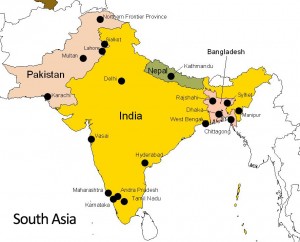An Outsider’s Perspective at the JNU incident, and Freedom of Speech in India

I moved to the US when I was 22, and have been here since. I tend to follow US politics and lot more than that in India, and have had a sporadic interest in things of political significance in India over the last fifteen years. So I have a mixed viewpoint when I read about strongly polarizing events in India like the JNU incident in February — one of an onlooker from far with an intimacy that comes from having spent your formative years there.
My interest was first piqued when I saw several posts on my facebook feed in Feb. Then I spoke to a friend of mine, and our conversation veered to this issue. Having no background, I asked her about the details, and she went to give me a version of the incidents with her opinions of the events that occurred. For those that do not have any clue about what I’m talking about, you can read versions of what transpired here, here, and here. There are several others, most opinionated, and I encourage you to google for similar articles for a more informed perspective.
I read several articles, and even listened to a legal scholar talk about sedition laws and freedom of speech. Most articles I read were in support of the JNU students’ right to speak up, which I tend to largely agree with. But the thing that caught my eye the most was the comments on each article. Most comments are acerbic, and end up demonizing the author of the article. Any support for freedom of speech is equivalent to being anti-nationalist. Every word is political. If you are for freedom of speech, you are an extremist wanting to overthrow the government! If you are in support of the notion that this was unconstitutional under sedition laws, then you are a right-wing propaganda machine promoting the right-wing agenda put forth by BJP!
To be honest, I’m not sure what the status is on the ground. And the Internet sure as hell brings the trolls out. Even that said, and juxtaposing what is a fairly polarized presidential bid in the US, I feel sad that this is the nature of debate in India. As an academic, I take great pride in being able to vociferously debate issues without it turning personal. Being rational and civil while being able to make your point are essential in any debate. Not everyone that does not subscribe to your viewpoint is bad, and being open to other ideas is the mark of an enlightened person.
This got me thinking about why there is such acrimony in discussing controversial topics, especially related to politics and nationalism. India is after all, a sub-continent and much more multi-cultural than most countries. We also span all economic strata. I spent time in three south Indian states during schooling, and that made me much more conscious of what a multi-cultural environment India is. But reflecting on my childhood days, I feel that debating hot button issues was discouraged. Political discussion is for students looking to get into trouble (Some of these views were reflected in the way main-stream politicians seem to address the JNU students and their desire to engage).
Somehow, the teachers and parents had their opinions, but discussion of these opinions was not for a child. In comparison to a family or high school in the United States, the level of engagement I had in debating political ideology and time spent in understanding the classic doctrines was little. I went to a well-known residential school that encouraged all round development but even there, there was little political debate. I strongly feel that this lack of engagement from an early age makes us ill equipped to reason with these issues as adults. Lack of a perspective, and lack of engagement, say with a good friend or teacher from college, who shares an opposing view, makes it easy for us to demagogue a person with a different viewpoint.
I also believe that universities are bastions of lively debate – some more relevant to the general public than others. As someone who’s currently teaching at a university and spent all his adult life in academia, my opinion is obviously biased. But if you buy my rant above on the need for better engagement at a young age, surely you agree that college students should be encouraged, not discouraged to debate all topics. Yes, this always results in a small fraction engaging in rather extreme viewpoints. But that is the price of freedom of speech. The problem in classifying some things as extreme and others not, is that that is a potentially subjective opinion. An example that keeps coming up on occasion when I talk to my parents is their bewilderment when they see the American flag on the shorts or t-shirt of some (usually young) person. This is, in their mind, denigrating the national flag. While I would not be the person wearing that piece of clothing, my feelings are not remotely as strong, and I’d like to believe that that person is paying respects to America/American flag in the best way they seem fit.
This central tenet, nothing is more sacred than freedom of speech itself, is what makes the freedom so powerful.
Another thought that comes to mind, particularly about the sedition laws, is that they seem like a remnant of the days when India was a fledgling democracy, and any debate about topics related to nationality and Kashmir would have been considered harmful. My parents were born roughly when India got its independence, and I can understand their strong opinions and that of their previous generation since they were close to the fight for independence. But I hope my generation, and the next are hopefully further enough from independence and partition that we can discuss these topics without the sensitivity that our previous generations placed on this topic and I hope we are allowed that freedom in all institutions that form our society.





